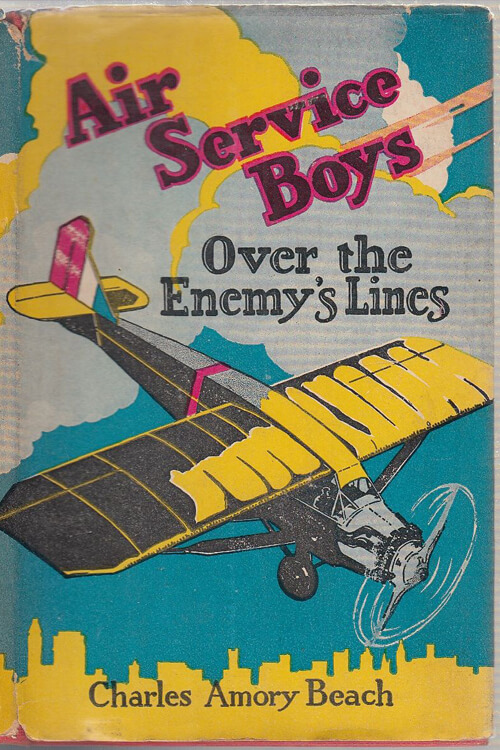
Air Service Boys Over the Enemy’s Lines
“Tom, what do you suppose that strange man who looked like a French peasant, yet wasn’t one, could have been up to late yesterday afternoon?”
“You mean the fellow discovered near the hangars at the aviation camp, Jack?”
“Yes. He seemed to go out of sight like a wreath of smoke does. Why, if the ground had opened and swallowed him up, once the hue and cry was raised, he couldn’t have vanished quicker. I wonder if what they say about him can be true?”
“That he was a German spy? Anything is possible in war times.”
“I guess you’re right there. German secret sympathizers, and spies in the bargain, seemed to bob up all over the United States before we crossed the ocean to do our fighting for France as aviators.”
“They certainly were busy bees, Jack, blowing up munition works, trying to destroy big railroad bridges to cripple traffic with the Allies over here; burning grain elevators in which France and Great Britain had big supplies of wheat stored; and even putting bombs aboard ocean liners that were timed to explode days later, when the boat would be a thousand miles from land.”
“Over in France here they make short work of spies, I’ve heard, Tom!”
“Yes, it’s a drumhead court-martial and trial. Then, if the man or woman is found guilty, the spy goes out with a firing squad to the most convenient stone wall. They never return, Jack.”
“Whee! That sounds like war times, doesn’t it? And to think the two of us are right on the firing line, amid all the scrapping. But, Tom, tell me, why should a tricky German spy want to hang out around the aviation field? He could hardly expect to pick up any news there that would be worth taking across the lines to the headquarters of the Crown Prince before Verdun.”
“Don’t be too sure of that, Jack. Perhaps he might learn of some contemplated bombing expedition, like that one we went on not so long ago.” And Tom Raymond smiled slightly.
“They are a mighty clever bunch, those spies,” admitted Jack Parmly.
“Why, Jack, half of the successes of the Kaiser’s armies on all fronts, Russia, France, and Rumania, can be laid at the door of his secret agents. They seem to be everywhere, trying to foment internal troubles, strikes, and discontent, so that when the Germans strike hard they meet a divided enemy in front.”
“Well, I certainly wish we had caught that fellow.”
“You were in the crowd, you told me, that scoured the whole neighborhood in search of him.”
“That’s right, I was. But say, he proved too foxy for us all. Anyway, we failed to find the rascal. Then night came on when we had to give our man-hunt over. And to think that I even glimpsed the fellow’s face in the bargain before the alarm went out!”
“Then you’d know him again perhaps, Jack, if ever you met him?”
“I think so. Though I suppose these spies have ways of changing their looks at times. But, to change the subject, Tom, it strikes me neither of us is groaning under the weight of game so far on our little side hunt.” And Jack Parmly grinned.
“Oh, I didn’t expect to run across anything, though that French peasant assured us there were still some rabbits in the burrows over here, three miles back of our sleeping quarters. That’s why, with a day off-duty, I took a notion to borrow an old Belgian-made double-barrel shotgun he owned, and walk out here.”
“More to stretch our legs and get the kinks out, than anything else, eh, Tom?”
“That’s it, Jack. Don’t you remember that while we were training at the aviation school at Pau we used often to walk from the town, eight miles distant, until we sighted that famous little old red barn at Pau, where the Wright Brothers conducted some of their experiments in flying heavier-than-air machines. That was some little hike.”
Read or download Book
Charles Amory Beach
In the throes of the vibrant and daring sphere of early 20th-century aviation, ‘Air Service Boys Flying for France’ presents the exhilarating escapades of two intrepid friends thrust into the crucible of World War I.
Biography.
Author Charles Amory Beach deftly navigates the intersection of burgeoning flight technology and the gritty reality of war, drawing readers, particularly a younger audience, into a narrative rich with action and historical verisimilitude. Beach’s prose is marked by its descriptive vividness and a pace that mirrors the hectic tumult of aerial dogfights and wartime exigencies. Beyond mere entertainment, the book serves as a literary homage to the valor of the Lafayette Escadrille, whose exploits galvanized the imaginations of many young Americans of that era. Charles Amory Beach, steeped in the patriotism and fervor surrounding the Great War, was driven by the ethos of his time to craft narratives that would not only regale but inspire youth with tales of heroism and camaraderie. His firsthand experience with military life and understanding of the Air Service’s growing significance provide an underpinning of authenticity that resonates throughout his work. This, welded to a backdrop of international conflict, imparts a poignancy and relevance to Beach’s compositions, making them more than mere juvenilia. ‘Recommended for enthusiasts of historical adventure and those seeking a pulse-quickening dive into the nascent era of aviation, ‘Air Service Boys Flying for France’ is a poignant testament to the daring and bravery that defined early aviators. Beach’s work is particularly suitable for young adults, with its accessible prose and swift narrative, ensuring it enthralls and reduces respect for the aviators who risked everything in the skies of a war-torn world.






